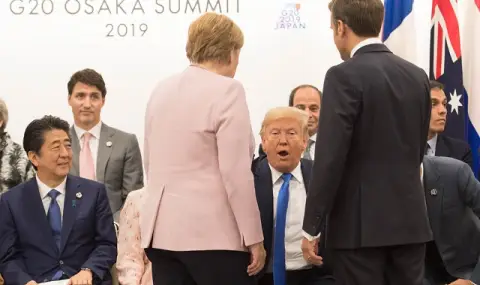European diplomats are preparing to tighten sanctions against Russia, anticipating that Donald Trump's return to the White House could undermine Western efforts to isolate Moscow. This was reported by "Reuters", citing sources familiar with the discussions.
Possible steps include clauses to identify and stop suspicious shipments of goods destined for Russia and broader restrictions on oil shipments, the sources said.
There are also discussions to change the requirement that the Russian central bank's asset freeze, the West's biggest single sanction against Moscow, must be renewed by European capitals every six months.
Several member states are working on the idea of a clause that would apply either to battlefield goods or to a wider range of banned exports, three EU diplomats said.
The clause would allow customs officials to detain shipments if the final destination appears illogical, such as crossing Russia to reach Central Asian countries.
Any softening by Washington would put Europe in a difficult position, since it is the United States, with broad powers to punish violations of sanctions worldwide, that mainly enforces the rules.
The European Union is now scrambling to find its own means to step up enforcement and strengthen its restrictions against Russia.
Several states are also discussing curbing "mislabeling" of products destined for Russia, looking for more accurate descriptions. The Baltic states, which border Russia, have long complained that exporters use EU customs codes.
EU member states are holding preliminary discussions on the shape of the 15th sanctions package after months of stalemate since Budapest took the helm on July 1.
At least 45 ships are expected to be added to the EU's sanctions list as Western allies seek to tighten the G7 price cap on Russian oil, one source said. Western sanctions officials believe that targeting specific tankers is the best way to hit more of Russian oil revenues.
Western powers are also starting to put pressure on the countries where the tankers are registered, sources told "Reuters".
The EU also wants to expand the use of the clause "No to Russia" in the next round of sanctions.
This would oblige subsidiaries of EU companies in third countries to prohibit the re-export of certain goods to Russia, including dual-use goods for military purposes, as well as ammunition and firearms.
Several countries, as well as the European Commission, are seeking to further limit other energy imports into Europe from Russia, including imports of liquefied natural gas (LNG), which have increased in recent months.
Belgium, France and others have asked the Commission to propose ways to increase the tracking of Russian LNG to the bloc.
According to the agency's sources, European diplomats will wait until the end of the year before seriously discussing new restrictions: by that time, the EU presidency will pass from Hungary, which has blocked many initiatives, to Poland, which takes a much tougher position.
p>
